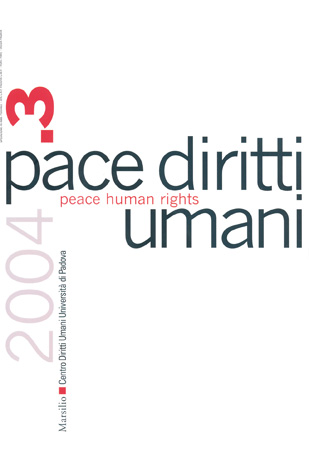Collections

Corte europea dei diritti umani: sentenza della Grande Camera nel caso Vo c. Francia, 8 luglio 2004. Nota
- Contained in
- Pace diritti umani - Peace Human Rights, 3/2004
- Pubblication type
- Documentazione
- Pages
- 151 - 163
- Language
- IT
Nota Case of Vo vs. France, Judgment of the European Court of Human Rights, 8 July 2004
Paolo De Stefani
In Vo vs. France (judgment July 8 2004), the Grand Chamber of the European Court of Human Rights discussed a case of alleged violation of art. 2 of the European Convention (right to life) as a consequence of the unintentional destruction of an embryo by a negligent gynaecologist. The facts occurred in 1991. After the death of the unborn baby girl, the parents instituted a criminal proceeding agaist the doctor (where they were represented as civil parties), on the assumption that the administrative proceeding against the hospital for damages was less convenient. The administrative complaint was lately statute-barred. The Cour d’assises found no legal basis for convicting the doctor, as the French law did not (and still does not) contain any provision on unintentional homicide of an embryo. The Appellate Court recognised instead that an homicide took place, extending to the embryo the provision of the French Penal Code concerning the unintentional homicide of a person. Subsequently, however, the Cour de cassation quashed the Appeals Court’s Chamber was therefore required to pronounce over the scope of art. 2, whether it implied also a protection of the unborn person (and in such case the lacuna in the French law would have been in breach of the European Convention), or it only referred to an individual after his or her birth. It is to be noted that the Vo case does not regard abortion, whose alleged inconsitency with the Convention had already been declared manifestly ill-founded. Even acknowledging that the embryo had indeed some rights under the Convention, the Grand Chamber found that lack of criminal prosecution in case of unintentional destruction of a foetus was not strictly required by art. 2 of the Convention, provided that civil, administrative or disciplinary proceedings were available for medical negligence. Accordingly, there has been no violation of art. 2 by France. According to this jurisprudence, the protection of the embryo lies on states’ in this matter. It may be argued however that the Court could soon have to reconsider its interpretation of art. 2, in the light of the rapid development of bio-technologies and related legislations.

